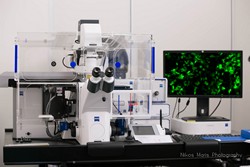Promoting research on human diseases
Over the years, the University of Crete Medical School, in the south of Greece, has made concerted efforts to establish a multidisciplinary scientific environment to foster excellence in research. The School's vision was to study areas of major biomedical importance, such as stem cell biology and autoimmune, cardiovascular, malignant and degenerative diseases. The EU-funded TRANSPOT(opens in new window) (Enhancing University of Crete Medical School scientific excellence and translational research potential in human diseases) project aimed to accelerate these efforts by enhancing the technological capability of the institution. This support programme included the establishment of state-of-the-art infrastructure such as the good manufacturing practices lab with positive-pressure modular clean rooms of different grades. The idea was to improve the regional research potential and increase the competitiveness of the institute at the European level. Despite progress over the years in understanding the mechanism of various disorders, translation of research findings into prevention and treatment represents a major challenge in medical research. During TRANSPOT, experienced researchers as well as junior research and technical staff were recruited and addressed fundamental biological questions relevant to a spectrum of human diseases. In addition, they used preclinical models to apply cell- or molecule-based therapeutic strategies. Overall, TRANSPOT served as a strategic investment for Greece by bringing multiple scientific, healthcare, economic and social benefits, thereby accelerating its networking with the rest of the EU. It also helped to reduce brain drain from Greece due to the economic crisis. In the future, the TRANSPOT facility will evolve into a translational medical research facility, which will develop opportunities for collaborative studies with the European biotechnology sector and pharmaceutical industry. To increase its sustainability, it will also offer expert diagnostic services and interaction with regional hospitals and clinics.



